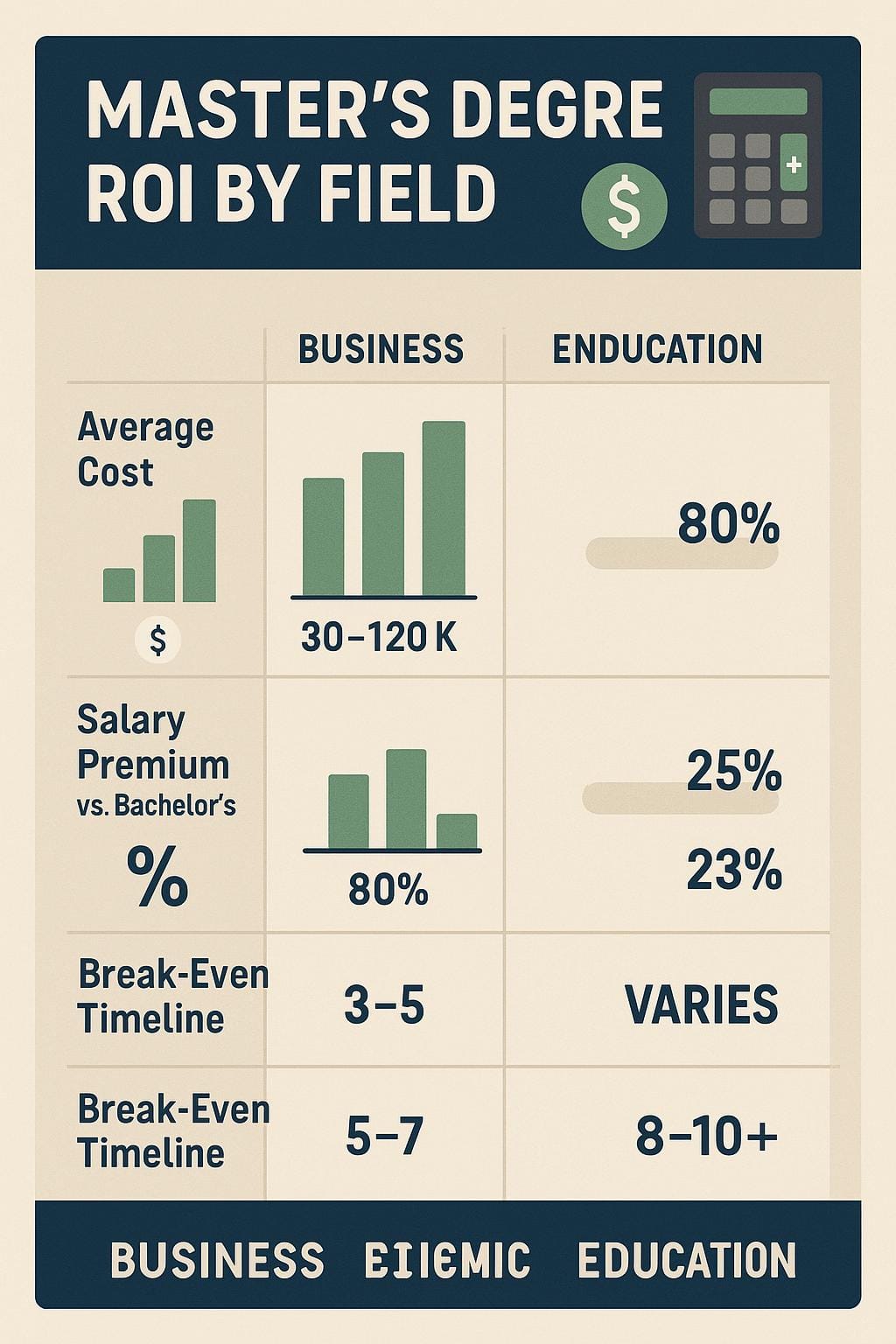Deciding whether to pursue a master’s degree represents one of the most significant educational and financial decisions many professionals face. The investment goes far beyond tuition—it encompasses opportunity costs, potential career advancement, and quality of life impacts that extend for decades after graduation. Analyzing this complex decision requires both quantitative financial calculations and qualitative assessment of personal and professional goals.
Key Takeaways
- Master’s degrees cost between $30,000-$120,000 on average, with graduate student debt averaging $71,000 per borrower
- Salary premiums vary dramatically by field—from 80% increases for MBAs to more modest gains in humanities
- Some careers effectively require master’s degrees (clinical psychology, speech-language pathology), while others value experience more
- Non-financial benefits include expanded professional networks, specialized knowledge, and higher job satisfaction
- High-value alternatives like professional certifications and specialized bootcamps can provide comparable benefits at lower cost
This post contains affiliate links. As an Amazon Associate, I earn from qualifying purchases at no extra cost to you. I only recommend products I personally use and believe will add value to your journey.
Understanding the Master’s Degree Value Equation
The popularity of master’s degrees has surged dramatically in recent decades, with conferrals increasing by over 70% in the last 20 years. This growth reflects both increasing employer demands and the perception that advanced degrees provide competitive advantages in the job market.
However, this educational investment comes with substantial costs. The price tag ranges from $30,000 at public universities to upwards of $120,000 at prestigious private institutions. Add in the opportunity cost of lost wages during study (approximately $50,000-$150,000), and the decision becomes even more consequential.
📦 Essential Graduate School Planning Resources
- 🔗 Comprehensive admissions strategy books to maximize acceptance chances
- 🔗 Official GRE prep materials for higher test scores
- 🔗 Financial planning workbooks to minimize graduate debt
As an Amazon Associate, I earn from qualifying purchases.
Calculating Your Master’s Degree ROI: A Financial Framework
Approaching this decision requires calculating a return on investment (ROI) using a simple formula: (Gain from Investment – Cost of Investment) / Cost of Investment × 100%. This quantitative approach helps determine how long it will take to recoup your educational investment.
Direct costs include tuition ($30,000-$120,000), annual fees ($2,000-$5,000), and books/materials ($1,000-$3,000 yearly). The most significant costs, however, often come from lost income during your studies and the interest accrued on student loans.
The financial benefits vary dramatically by field. Business graduates with MBAs see an average 80% salary increase ($115,000 vs $65,000), while Engineering master’s holders gain about 25% ($95,000 vs $76,000), and Education graduates see a 23% premium ($63,000 vs $51,000).
These salary differentials translate into varying break-even timelines. Business graduates typically recoup costs within 3-5 years, STEM graduates in 5-7 years, but Humanities graduates may need 8-10+ years to break even financially.
📦 Financial Planning Tools for Graduate Students
- 🔗 Student loan planning calculator for optimized repayment strategies
- 🔗 Educational ROI guidebook for maximizing career investments
- 🔗 Budget-friendly graduate school survival guide
As an Amazon Associate, I earn from qualifying purchases.
Related Guides: Check out our related articles for more helpful tips and insights.
Master’s Degree Necessity Spectrum: Field-by-Field Analysis
The value of a master’s degree varies dramatically depending on your field. In some careers, these credentials are essentially mandatory for entry or advancement. Clinical Psychology requires a master’s for licensure, while Speech-Language Pathology positions are filled by master’s degree holders 98% of the time.
Other fields show master’s degrees as highly advantageous but not strictly required. Computer Science graduates see a 26% salary boost, while Healthcare Management positions typically offer 35-40% higher compensation for those with advanced degrees.
For fields like Marketing (+20% salary) or Communications (+15%), master’s degrees are beneficial but optional, with experience often compensating for formal education. In technology, sales, creative industries, and entrepreneurship, practical experience frequently outweighs academic credentials entirely.
This spectrum reflects changing employer preferences. Today, approximately 33% of job listings require master’s degrees—up from just 20% in 2000. The trend shows employers increasingly using graduate education as a filtering mechanism in competitive hiring situations.
📚 Recommended Reading
- 📖 Is Graduate School Right For You? by Career Experts – Perfect for those on the decision fence
- 📖 Strategic Career Advancement by Leading Professionals – Advanced educational planning
As an Amazon Associate, I earn from qualifying purchases.
Beyond the Paycheck: Non-Financial Benefits of Master’s Education
While salary increases often drive graduate education decisions, the non-financial benefits can be equally significant. Graduate programs provide powerful networking opportunities, with the average student connecting with 75+ field-specific professionals during their studies.
The specialized knowledge gained frequently translates into career advantages, with 87% of master’s graduates reporting regular use of advanced skills in their work. These specialized competencies often position professionals as experts in their fields.
Job satisfaction metrics consistently favor those with graduate education. Research shows 76% of master’s graduates report high job satisfaction compared to 61% of those with bachelor’s degrees only.
Master’s degrees also build career resilience. During the 2020 economic downturn, master’s degree holders experienced unemployment rates 2% lower than those with only undergraduate degrees. This credential can act as a buffer against economic instability.
Global mobility represents another significant advantage. International employers value US master’s degrees highly, with 65% reporting these credentials as important factors in hiring decisions. This recognition can facilitate international career opportunities and immigration advantages.
🛠️ My Complete Graduate Success Toolkit
Here’s everything I personally use and recommend:
As an Amazon Associate, I earn from qualifying purchases.
High-Value Alternatives: Getting Master’s-Level Benefits Without the Degree
For those hesitant about the time and financial commitment of a full master’s program, several high-value alternatives exist. Professional certifications like the Project Management Professional (PMP) cost around $10,000 but deliver an average 22% salary increase—comparable to many master’s degrees at a fraction of the price.
Intensive bootcamps represent another powerful alternative. Coding bootcamps average $13,500 and achieve 83% employment rates with $65,000 average starting salaries, comparable to Computer Science master’s outcomes at one-fifth the cost and time commitment.
Here are some other valuable alternatives to consider:
- Specialized industry credentials like the CFA or CFP in finance
- Employer-sponsored education (available at 56% of major companies)
- Self-directed learning through targeted MOOCs and specialized platforms
- Focused professional experience in high-demand skill areas
The professional experience premium shouldn’t be underestimated. In many fields, 5-7 years of targeted experience often equals or exceeds the value of a master’s degree. This is particularly true in technology, where 72% of hiring managers report valuing demonstrated skills over formal education.
Making Your Master’s Decision: A Personal Assessment
The question “Is a master’s degree worth it?” ultimately requires personalized analysis. Start by examining your specific field’s requirements and typical compensation differences. Calculate your unique ROI based on program costs, potential earnings increase, and opportunity costs.
Consider your career timeline and goals. Are you seeking immediate advancement, or building for long-term career development? Can you achieve similar outcomes through alternative credentials or strategic experience acquisition? The answer often depends on your specific career aspirations, financial situation, and personal learning preferences.
For those in fields where master’s degrees are essentially required (clinical roles, education leadership), the decision is relatively straightforward. For everyone else, careful cost-benefit analysis should guide this significant investment in your future.
Sources
Bureau of Labor Statistics – Education Pays
Education Data – Average Graduate Student Loan Debt
Northeastern University – Is a Masters Degree Worth It?
Forbes Advisor – Is a Masters Degree Worth It?
BestColleges – Masters Degree Jobs
Course Report – Coding Bootcamp Job Placement Report










